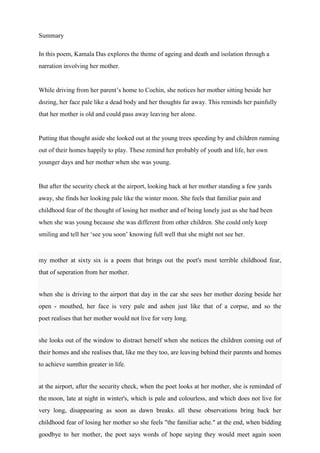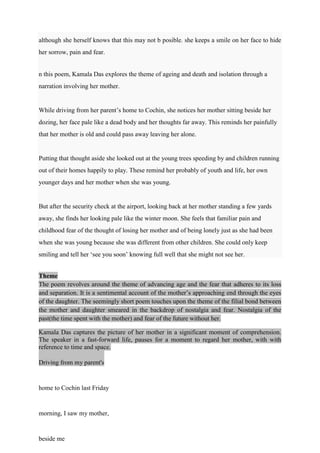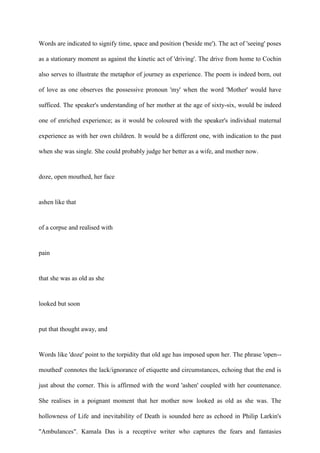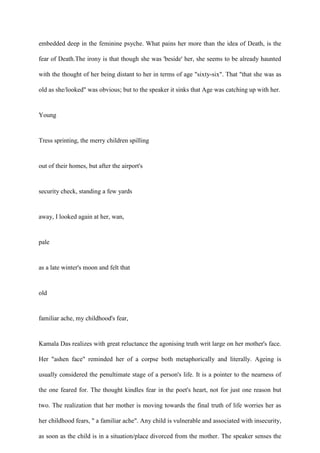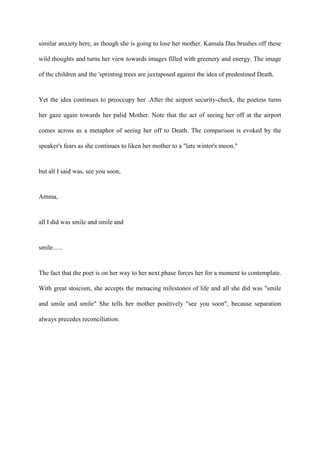Summary
- 1. Summary In this poem, Kamala Das explores the theme of ageing and death and isolation through a narration involving her mother. While driving from her parentÔÇÖs home to Cochin, she notices her mother sitting beside her dozing, her face pale like a dead body and her thoughts far away. This reminds her painfully that her mother is old and could pass away leaving her alone. Putting that thought aside she looked out at the young trees speeding by and children running out of their homes happily to play. These remind her probably of youth and life, her own younger days and her mother when she was young. But after the security check at the airport, looking back at her mother standing a few yards away, she finds her looking pale like the winter moon. She feels that familiar pain and childhood fear of the thought of losing her mother and of being lonely just as she had been when she was young because she was different from other children. She could only keep smiling and tell her ÔÇÿsee you soonÔÇÖ knowing full well that she might not see her. my mother at sixty six is a poem that brings out the poet's most terrible childhood fear, that of seperation from her mother. when she is driving to the airport that day in the car she sees her mother dozing beside her open - mouthed, her face is very pale and ashen just like that of a corpse, and so the poet realises that her mother would not live for very long. she looks out of the window to distract herself when she notices the children coming out of their homes and she realises that, like me they too, are leaving behind their parents and homes to achieve sumthin greater in life. at the airport, after the security check, when the poet looks at her mother, she is reminded of the moon, late at night in winter's, which is pale and colourless, and which does not live for very long, disappearing as soon as dawn breaks. all these observations bring back her childhood fear of losing her mother so she feels "the familiar ache." at the end, when bidding goodbye to her mother, the poet says words of hope saying they would meet again soon
- 2. although she herself knows that this may not b posible. she keeps a smile on her face to hide her sorrow, pain and fear. n this poem, Kamala Das explores the theme of ageing and death and isolation through a narration involving her mother. While driving from her parentÔÇÖs home to Cochin, she notices her mother sitting beside her dozing, her face pale like a dead body and her thoughts far away. This reminds her painfully that her mother is old and could pass away leaving her alone. Putting that thought aside she looked out at the young trees speeding by and children running out of their homes happily to play. These remind her probably of youth and life, her own younger days and her mother when she was young. But after the security check at the airport, looking back at her mother standing a few yards away, she finds her looking pale like the winter moon. She feels that familiar pain and childhood fear of the thought of losing her mother and of being lonely just as she had been when she was young because she was different from other children. She could only keep smiling and tell her ÔÇÿsee you soonÔÇÖ knowing full well that she might not see her. Theme The poem revolves around the theme of advancing age and the fear that adheres to its loss and separation. It is a sentimental account of the motherÔÇÖs approaching end through the eyes of the daughter. The seemingly short poem touches upon the theme of the filial bond between the mother and daughter smeared in the backdrop of nostalgia and fear. Nostalgia of the past(the time spent with the mother) and fear of the future without her. Kamala Das captures the picture of her mother in a significant moment of comprehension. The speaker in a fast-forward life, pauses for a moment to regard her mother, with with reference to time and space. Driving from my parent's home to Cochin last Friday morning, I saw my mother, beside me
- 3. Words are indicated to signify time, space and position ('beside me'). The act of 'seeing' poses as a stationary moment as against the kinetic act of 'driving'. The drive from home to Cochin also serves to illustrate the metaphor of journey as experience. The poem is indeed born, out of love as one observes the possessive pronoun 'my' when the word 'Mother' would have sufficed. The speaker's understanding of her mother at the age of sixty-six, would be indeed one of enriched experience; as it would be coloured with the speaker's individual maternal experience as with her own children. It would be a different one, with indication to the past when she was single. She could probably judge her better as a wife, and mother now. doze, open mouthed, her face ashen like that of a corpse and realised with pain that she was as old as she looked but soon put that thought away, and Words like 'doze' point to the torpidity that old age has imposed upon her. The phrase 'open-- mouthed' connotes the lack/ignorance of etiquette and circumstances, echoing that the end is just about the corner. This is affirmed with the word 'ashen' coupled with her countenance. She realises in a poignant moment that her mother now looked as old as she was. The hollowness of Life and inevitability of Death is sounded here as echoed in Philip Larkin's "Ambulances". Kamala Das is a receptive writer who captures the fears and fantasies
- 4. embedded deep in the feminine psyche. What pains her more than the idea of Death, is the fear of Death.The irony is that though she was 'beside' her, she seems to be already haunted with the thought of her being distant to her in terms of age "sixty-six". That "that she was as old as she/looked" was obvious; but to the speaker it sinks that Age was catching up with her. Young Tress sprinting, the merry children spilling out of their homes, but after the airport's security check, standing a few yards away, I looked again at her, wan, pale as a late winter's moon and felt that old familiar ache, my childhood's fear, Kamala Das realizes with great reluctance the agonising truth writ large on her mother's face. Her "ashen face" reminded her of a corpse both metaphorically and literally. Ageing is usually considered the penultimate stage of a person's life. It is a pointer to the nearness of the one feared for. The thought kindles fear in the poet's heart, not for just one reason but two. The realization that her mother is moving towards the final truth of life worries her as her childhood fears, " a familiar ache". Any child is vulnerable and associated with insecurity, as soon as the child is in a situation/place divorced from the mother. The speaker senses the
- 5. similar anxiety here, as though she is going to lose her mother. Kamala Das brushes off these wild thoughts and turns her view towards images filled with greenery and energy. The image of the children and the 'sprinting trees are juxtaposed against the idea of predestined Death. Yet the idea continues to preoccupy her .After the airport security-check, the poetess turns her gaze again towards her palid Mother. Note that the act of seeing her off at the airport comes across as a metaphor of seeing her off to Death. The comparison is evoked by the speaker's fears as she continues to liken her mother to a "late winter's moon." but all I said was, see you soon, Amma, all I did was smile and smile and smile...... The fact that the poet is on her way to her next phase forces her for a moment to contemplate. With great stoicism, she accepts the menacing milestones of life and all she did was "smile and smile and smile" She tells her mother positively "see you soon", because separation always precedes reconciliation.

